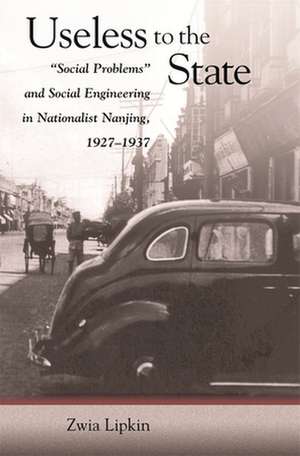Useless to the State – "Social Problems" and Social Engineering in Nationalist Nanjing, 1927–1937: Harvard East Asian Monographs
Autor Zwia Lipkinen Limba Engleză Hardback – 30 mar 2006
However, twenty years later, when M. R. Schafer, another Nanjing University professor, showed his students a film that included his own photographs of the poor quarters of Nanjing, his students were so upset that they demanded his expulsion from China. Zwia Lipkin explores the reasons for these starkly different reactions. Nanjing in the 1910s was a quiet city compared to 1930s Nanjing, which was by that time the national capital. Nanjing had become a symbol of national authority, aiming not only to become a model of modernization for the rest of China, but also to surpass Paris, London, and Washington. Underlying all of Nanjing's policies was a concern for the capital's image and looks--offensive people were allowed to exist as long as they remained invisible. Lipkin exposes both the process of social engineering and the ways in which the suppressed reacted to their abuse. Like Professor Schafer's movie, this book puts the poor at the center of the picture, defying efforts to make them invisible.
Din seria Harvard East Asian Monographs
-
 Preț: 262.55 lei
Preț: 262.55 lei -
 Preț: 303.54 lei
Preț: 303.54 lei - 19%
 Preț: 357.45 lei
Preț: 357.45 lei -
 Preț: 329.12 lei
Preț: 329.12 lei - 13%
 Preț: 387.46 lei
Preț: 387.46 lei - 13%
 Preț: 369.50 lei
Preț: 369.50 lei -
 Preț: 146.80 lei
Preț: 146.80 lei -
 Preț: 208.55 lei
Preț: 208.55 lei -
 Preț: 343.42 lei
Preț: 343.42 lei -
 Preț: 265.19 lei
Preț: 265.19 lei -
 Preț: 343.75 lei
Preț: 343.75 lei -
 Preț: 154.08 lei
Preț: 154.08 lei -
 Preț: 359.61 lei
Preț: 359.61 lei -
 Preț: 304.90 lei
Preț: 304.90 lei - 13%
 Preț: 368.38 lei
Preț: 368.38 lei - 13%
 Preț: 343.16 lei
Preț: 343.16 lei - 13%
 Preț: 345.28 lei
Preț: 345.28 lei -
 Preț: 236.02 lei
Preț: 236.02 lei - 13%
 Preț: 343.76 lei
Preț: 343.76 lei -
 Preț: 401.74 lei
Preț: 401.74 lei -
 Preț: 313.87 lei
Preț: 313.87 lei - 13%
 Preț: 410.80 lei
Preț: 410.80 lei -
 Preț: 373.10 lei
Preț: 373.10 lei - 13%
 Preț: 362.75 lei
Preț: 362.75 lei -
 Preț: 150.59 lei
Preț: 150.59 lei -
 Preț: 225.79 lei
Preț: 225.79 lei -
 Preț: 202.85 lei
Preț: 202.85 lei -
 Preț: 230.64 lei
Preț: 230.64 lei -
 Preț: 285.21 lei
Preț: 285.21 lei -
 Preț: 267.20 lei
Preț: 267.20 lei - 13%
 Preț: 342.71 lei
Preț: 342.71 lei -
 Preț: 373.98 lei
Preț: 373.98 lei -
 Preț: 200.84 lei
Preț: 200.84 lei -
 Preț: 328.44 lei
Preț: 328.44 lei -
 Preț: 186.22 lei
Preț: 186.22 lei -
 Preț: 379.32 lei
Preț: 379.32 lei -
 Preț: 239.78 lei
Preț: 239.78 lei -
 Preț: 367.33 lei
Preț: 367.33 lei - 19%
 Preț: 357.55 lei
Preț: 357.55 lei -
 Preț: 373.36 lei
Preț: 373.36 lei -
 Preț: 329.12 lei
Preț: 329.12 lei -
 Preț: 376.75 lei
Preț: 376.75 lei -
 Preț: 210.11 lei
Preț: 210.11 lei -
 Preț: 194.54 lei
Preț: 194.54 lei - 27%
 Preț: 187.08 lei
Preț: 187.08 lei -
 Preț: 185.29 lei
Preț: 185.29 lei -
 Preț: 317.86 lei
Preț: 317.86 lei -
 Preț: 320.20 lei
Preț: 320.20 lei
Preț: 238.67 lei
Preț vechi: 312.59 lei
-24% Nou
Puncte Express: 358
Preț estimativ în valută:
45.67€ • 47.41$ • 38.09£
45.67€ • 47.41$ • 38.09£
Carte indisponibilă temporar
Doresc să fiu notificat când acest titlu va fi disponibil:
Se trimite...
Preluare comenzi: 021 569.72.76
Specificații
ISBN-13: 9780674021327
ISBN-10: 0674021320
Pagini: 424
Dimensiuni: 164 x 234 x 35 mm
Greutate: 0.77 kg
Editura: Harvard University Press
Seria Harvard East Asian Monographs
Locul publicării:United States
ISBN-10: 0674021320
Pagini: 424
Dimensiuni: 164 x 234 x 35 mm
Greutate: 0.77 kg
Editura: Harvard University Press
Seria Harvard East Asian Monographs
Locul publicării:United States
Descriere
In 1911, when a professor took his students to tour Nanjing's shantytowns, one student was grateful as his eyes had been opened to the poverty in his own city. Years later, when another professor showed his students a film on the poor quarters of Nanjing, they demanded his expulsion. This book explores the reasons for these different reactions.
